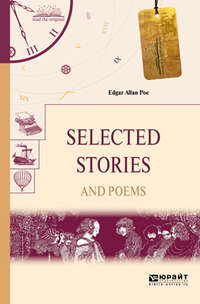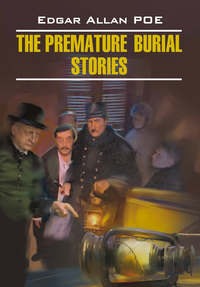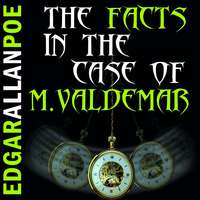 полная версия
полная версияThe Complete Stories of Edgar Allan Poe
“That I certainly will, Mr. Blackwood,” said I.
“Good!” he replied. “I see you are a pupil after my own heart. But I must put you au fait to the details necessary in composing what may be denominated a genuine Blackwood article of the sensation stamp – the kind which you will understand me to say I consider the best for all purposes.
“The first thing requisite is to get yourself into such a scrape as no one ever got into before. The oven, for instance, – that was a good hit. But if you have no oven, or big bell, at hand, and if you cannot conveniently tumble out of a balloon, or be swallowed up in an earthquake, or get stuck fast in a chimney, you will have to be contented with simply imagining some similar misadventure. I should prefer, however, that you have the actual fact to bear you out. Nothing so well assists the fancy, as an experimental knowledge of the matter in hand. ‘Truth is strange,’ you know, ‘stranger than fiction’ – besides being more to the purpose.”
Here I assured him I had an excellent pair of garters, and would go and hang myself forthwith.
“Good!” he replied, “do so; – although hanging is somewhat hackneyed. Perhaps you might do better. Take a dose of Brandreth’s pills, and then give us your sensations. However, my instructions will apply equally well to any variety of misadventure, and in your way home you may easily get knocked in the head, or run over by an omnibus, or bitten by a mad dog, or drowned in a gutter. But to proceed.
“Having determined upon your subject, you must next consider the tone, or manner, of your narration. There is the tone didactic, the tone enthusiastic, the tone natural – all common-place enough. But then there is the tone laconic, or curt, which has lately come much into use. It consists in short sentences. Somehow thus: Can’t be too brief. Can’t be too snappish. Always a full stop. And never a paragraph.
“Then there is the tone elevated, diffusive, and interjectional. Some of our best novelists patronize this tone. The words must be all in a whirl, like a humming-top, and make a noise very similar, which answers remarkably well instead of meaning. This is the best of all possible styles where the writer is in too great a hurry to think.
“The tone metaphysical is also a good one. If you know any big words this is your chance for them. Talk of the Ionic and Eleatic schools – of Archytas, Gorgias, and Alcmæon. Say something about objectivity and subjectivity. Be sure and abuse a man named Locke. Turn up your nose at things in general, and when you let slip anything a little too absurd, you need not be at the trouble of scratching it out, but just add a foot-note, and say that you are indebted for the above profound observation to the ‘Kritik der reinem Vernunft,‘ or to the ‘Metaphysische Anfangsgrunde der Naturwissenchaft.‘ This would look erudite and – and – and frank.
“There are various other tones of equal celebrity, but I shall mention only two more – the tone transcendental and the tone heterogeneous. In the former the merit consists in seeing into the nature of affairs a very great deal farther than any body else. This second sight is very efficient when properly managed. A little reading of the ‘Dial’ will carry you a great way. Eschew, in this case, big words; get them as small as possible, and write them upside down. Look over Channing’s poems and quote what he says about a ‘fat little man with a delusive show of Can.’ Put in something about the Supernal Oneness. Don’t say a syllable about the Infernal Twoness. Above all, study innuendo. Hint every thing – assert nothing. If you feel inclined to say ‘bread and butter,’ do not by any means say it outright. You may say anything and everything approaching to ‘bread and butter.’ You may hint at buck-wheat cake, or you may even go so far as to insinuate oatmeal porridge, but if bread and butter be your real meaning, be cautious, my dear Miss Psyche, not on any account to say ‘bread and butter!’
I assured him that I should never say it again as long as I lived. He kissed me and continued:
“As for the tone heterogeneous, it is merely a judicious mixture, in equal proportions, of all the other tones in the world, and is consequently made up of everything deep, great, odd, piquant, pertinent, and pretty.
“Let us suppose now you have determined upon your incidents and tone. The most important portion – in fact, the soul of the whole business, is yet to be attended to – I allude to the filling up. It is not to be supposed that a lady, or gentleman either, has been leading the life of a book-worm. And yet above all things it is necessary that your article have an air of erudition, or at least afford evidence of extensive general reading. Now I’ll put you in the way of accomplishing this point. See here!” (pulling down some three or four ordinary-looking volumes, and opening them at random). “By casting your eye down almost any page of any book in the world, you will be able to perceive at once a host of little scraps of either learning or bel-esprit-ism, which are the very thing for the spicing of a Blackwood article. You might as well note down a few while I read them to you. I shall make two divisions: first, Piquant Facts for the Manufacture of Similes; and, second, Piquant Expressions to be introduced as occasion may require. Write now!” – and I wrote as he dictated.
“PIQUANT FACTS FOR SIMILES. ‘There were originally but three Muses – Melete, Mneme, Aœde – meditation, memory, and singing.’ You may make a good deal of that little fact if properly worked. You see it is not generally known, and looks recherché. You must be careful and give the thing with a downright improviso air.
“Again. ‘The river Alpheus passed beneath the sea, and emerged without injury to the purity of its waters.’ Rather stale that, to be sure, but, if properly dressed and dished up, will look quite as fresh as ever.
“Here is something better. ‘The Persian Iris appears to some persons to possess a sweet and very powerful perfume, while to others it is perfectly scentless.’ Fine that, and very delicate! Turn it about a little, and it will do wonders. We’ll have something else in the botanical line. There’s nothing goes down so well, especially with the help of a little Latin. Write!
”’The Epidendrum Flos Aeris, of Java, bears a very beautiful flower, and will live when pulled up by the roots. The natives suspend it by a cord from the ceiling, and enjoy its fragrance for years.’ That’s capital! That will do for the similes. Now for the Piquant Expressions.
“PIQUANT EXPRESSIONS. ‘The venerable Chinese novel Ju-Kiao-Li.‘ Good! By introducing these few words with dexterity you will evince your intimate acquaintance with the language and literature of the Chinese. With the aid of this you may either get along without either Arabic, or Sanscrit, or Chickasaw. There is no passing muster, however, without Spanish, Italian, German, Latin, and Greek. I must look you out a little specimen of each. Any scrap will answer, because you must depend upon your own ingenuity to make it fit into your article. Now write!
”’Aussi tendre que Zaire‘ – as tender as Zaire – French. Alludes to the frequent repetition of the phrase, la tendre Zaire, in the French tragedy of that name. Properly introduced, will show not only your knowledge of the language, but your general reading and wit. You can say, for instance, that the chicken you were eating (write an article about being choked to death by a chicken-bone) was not altogether aussi tendre que Zaire. Write!
‘Ven muerte tan escondida,Que no te sienta venir,Porque el plazer del morir,No me torne a dar la vida.’“That’s Spanish – from Miguel de Cervantes. ‘Come quickly, O death! but be sure and don’t let me see you coming, lest the pleasure I shall feel at your appearance should unfortunately bring me back again to life.’ This you may slip in quite à propos when you are struggling in the last agonies with the chicken-bone. Write!
‘Il pover ‘huomo che non se’n era accorto,Andava combattendo, e era morto.’That’s Italian, you perceive – from Ariosto. It means that a great hero, in the heat of combat, not perceiving that he had been fairly killed, continued to fight valiantly, dead as he was. The application of this to your own case is obvious – for I trust, Miss Psyche, that you will not neglect to kick for at least an hour and a half after you have been choked to death by that chicken-bone. Please to write!
‘Und sterb’ich doch, no sterb’ich dennDurch sie – durch sie!’That’s German – from Schiller. ‘And if I die, at least I die – for thee – for thee!’ Here it is clear that you are apostrophizing the cause of your disaster, the chicken. Indeed what gentleman (or lady either) of sense, would’nt die, I should like to know, for a well fattened capon of the right Molucca breed, stuffed with capers and mushrooms, and served up in a salad-bowl, with orange-jellies en mosüiques. Write! (You can get them that way at Tortoni’s,) – Write, if you please!
“Here is a nice little Latin phrase, and rare too, (one can’t be too recherché or brief in one’s Latin, it’s getting so common,) – ignoratio elenchi. He has committed an ignoratio elenchi – that is to say, he has understood the words of your proposition, but not the idea. The man was a fool, you see. Some poor fellow whom you address while choking with that chicken-bone, and who therefore didn’t precisely understand what you were talking about. Throw the ignoratio elenchi in his teeth, and, at once, you have him annihilated. If he dares to reply, you can tell him from Lucan (here it is) that speeches are mere anemonae verborum, anemone words. The anemone, with great brilliancy, has no smell. Or, if he begins to bluster, you may be down upon him with insomnia Jovis, reveries of Jupiter – a phrase which Silius Italicus (see here!) applies to thoughts pompous and inflated. This will be sure and cut him to the heart. He can do nothing but roll over and die. Will you be kind enough to write?
“In Greek we must have something pretty – from Demosthenes, for example. Ανερo φευγων χαι παλιν μαχεσεται. [Aner o pheugoen kai palin makesetai.] There is a tolerably good translation of it in Hudibras —
For he that flies may fight again,Which he can never do that’s slain.In a Blackwood article nothing makes so fine a show as your Greek. The very letters have an air of profundity about them. Only observe, madam, the astute look of that Epsilon! That Phi ought certainly to be a bishop! Was ever there a smarter fellow than that Omicron? Just twig that Tau! In short, there is nothing like Greek for a genuine sensation-paper. In the present case your application is the most obvious thing in the world. Rap out the sentence, with a huge oath, and by way of ultimatum at the good-for-nothing dunder-headed villain who couldn’t understand your plain English in relation to the chicken-bone. He’ll take the hint and be off, you may depend upon it.”
These were all the instructions Mr. B. could afford me upon the topic in question, but I felt they would be entirely sufficient. I was, at length, able to write a genuine Blackwood article, and determined to do it forthwith. In taking leave of me, Mr. B. made a proposition for the purchase of the paper when written; but as he could offer me only fifty guineas a sheet, I thought it better to let our society have it, than sacrifice it for so paltry a sum. Notwithstanding this niggardly spirit, however, the gentleman showed his consideration for me in all other respects, and indeed treated me with the greatest civility. His parting words made a deep impression upon my heart, and I hope I shall always remember them with gratitude.
“My dear Miss Zenobia,” he said, while the tears stood in his eyes, “is there anything else I can do to promote the success of your laudable undertaking? Let me reflect! It is just possible that you may not be able, so soon as convenient, to – to – get yourself drowned, or – choked with a chicken-bone, or – or hung, – or – bitten by a – but stay! Now I think me of it, there are a couple of very excellent bull-dogs in the yard – fine fellows, I assure you – savage, and all that – indeed just the thing for your money – they’ll have you eaten up, auriculas and all, in less than five minutes (here’s my watch!) – and then only think of the sensations! Here! I say – Tom! – Peter! – Dick, you villain! – let out those” – but as I was really in a great hurry, and had not another moment to spare, I was reluctantly forced to expedite my departure, and accordingly took leave at once – somewhat more abruptly, I admit, than strict courtesy would have otherwise, allowed.
It was my primary object upon quitting Mr. Blackwood, to get into some immediate difficulty, pursuant to his advice, and with this view I spent the greater part of the day in wandering about Edinburgh, seeking for desperate adventures – adventures adequate to the intensity of my feelings, and adapted to the vast character of the article I intended to write. In this excursion I was attended by one negro-servant Pompey, and my little lap-dog Diana, whom I had brought with me from Philadelphia. It was not, however, until late in the afternoon that I fully succeeded in my arduous undertaking. An important event then happened of which the following Blackwood article, in the tone heterogeneous, is the substance and result.
THE END
A Predicament
What chance, good lady, hath bereft you thus?
Comus.
IT was a quiet and still afternoon when I strolled forth in the goodly city of Edina. The confusion and bustle in the streets were terrible. Men were talking. Women were screaming. Children were choking. Pigs were whistling. Carts they rattled. Bulls they bellowed. Cows they lowed. Horses they neighed. Cats they caterwauled. Dogs they danced. Danced! Could it then be possible? Danced! Alas, thought I, my dancing days are over! Thus it is ever. What a host of gloomy recollections will ever and anon be awakened in the mind of genius and imaginative contemplation, especially of a genius doomed to the everlasting, and eternal, and continual, and, as one might say, the – continued – yes, the continued and continuous, bitter, harassing, disturbing, and, if I may be allowed the expression, the very disturbing influence of the serene, and godlike, and heavenly, and exalted, and elevated, and, purifying effect of what may be rightly termed the most enviable, the most truly enviable – nay! the most benignly beautiful, the most deliciously ethereal, and, as it were, the most pretty (if I may use so bold an expression) thing (pardon me, gentle reader!) in the world – but I am always led away by my feelings. In such a mind, I repeat, what a host of recollections are stirred up by a trifle! The dogs danced! I – I could not! They frisked – I wept. They capered – I sobbed aloud. Touching circumstances! which cannot fail to bring to the recollection of the classical reader that exquisite passage in relation to the fitness of things, which is to be found in the commencement of the third volume of that admirable and venerable Chinese novel the Jo-Go-Slow.
In my solitary walk through the city I had two humble but faithful companions. Diana, my poodle! sweetest of creatures! She had a quantity of hair over her one eye, and a blue riband tied fashionably around her neck. Diana was not more than five inches in height, but her head was somewhat bigger than her body, and her tail, being cut off exceedingly close, gave an air of injured innocence to the interesting animal which rendered her a favorite with all.
And Pompey, my negro! – sweet Pompey! how shall I ever forget thee? I had taken Pompey’s arm. He was three feet in height (I like to be particular) and about seventy, or perhaps eighty, years of age. He had bow-legs and was corpulent. His mouth should not be called small, nor his ears short. His teeth, however, were like pearl, and his large full eyes were deliciously white. Nature had endowed him with no neck, and had placed his ankles (as usual with that race) in the middle of the upper portion of the feet. He was clad with a striking simplicity. His sole garments were a stock of nine inches in height, and a nearly-new drab overcoat which had formerly been in the service of the tall, stately, and illustrious Dr. Moneypenny. It was a good overcoat. It was well cut. It was well made. The coat was nearly new. Pompey held it up out of the dirt with both hands.
There were three persons in our party, and two of them have already been the subject of remark. There was a third – that person was myself. I am the Signora Psyche Zenobia. I am not Suky Snobbs. My appearance is commanding. On the memorable occasion of which I speak I was habited in a crimson satin dress, with a sky-blue Arabian mantelet. And the dress had trimmings of green agraffas, and seven graceful flounces of the orange-colored auricula. I thus formed the third of the party. There was the poodle. There was Pompey. There was myself. We were three. Thus it is said there were originally but three Furies – Melty, Nimmy and Hetty – Meditation, Memory, and Fiddling.
Leaning upon the arm of the gallant Pompey, and attended at a respectable distance by Diana, I proceeded down one of the populous and very pleasant streets of the now deserted Edina. On a sudden, there presented itself to view a church – a Gothic cathedral – vast, venerable, and with a tall steeple, which towered into the sky. What madness now possessed me? Why did I rush upon my fate? I was seized with an uncontrollable desire to ascend the giddy pinnacle, and thence survey the immense extent of the city. The door of the cathedral stood invitingly open. My destiny prevailed. I entered the ominous archway. Where then was my guardian angel? – if indeed such angels there be. If! Distressing monosyllable! what world of mystery, and meaning, and doubt, and uncertainty is there involved in thy two letters! I entered the ominous archway! I entered; and, without injury to my orange-colored auriculas, I passed beneath the portal, and emerged within the vestibule. Thus it is said the immense river Alfred passed, unscathed, and unwetted, beneath the sea.
I thought the staircase would never have an end. Round! Yes, they went round and up, and round and up and round and up, until I could not help surmising, with the sagacious Pompey, upon whose supporting arm I leaned in all the confidence of early affection – I could not help surmising that the upper end of the continuous spiral ladder had been accidentally, or perhaps designedly, removed. I paused for breath; and, in the meantime, an accident occurred of too momentous a nature in a moral, and also in a metaphysical point of view, to be passed over without notice. It appeared to me – indeed I was quite confident of the fact – I could not be mistaken – no! I had, for some moments, carefully and anxiously observed the motions of my Diana – I say that I could not be mistaken – Diana smelt a rat! At once I called Pompey’s attention to the subject, and he – he agreed with me. There was then no longer any reasonable room for doubt. The rat had been smelled – and by Diana. Heavens! shall I ever forget the intense excitement of the moment? Alas! what is the boasted intellect of man? The rat! – it was there – that is to say, it was somewhere. Diana smelled the rat. I – I could not! Thus it is said the Prussian Isis has, for some persons, a sweet and very powerful perfume, while to others it is perfectly scentless.
The staircase had been surmounted, and there were now only three or four more upward steps intervening between us and the summit. We still ascended, and now only one step remained. One step! One little, little step! Upon one such little step in the great staircase of human life how vast a sum of human happiness or misery often depends! I thought of myself, then of Pompey, and then of the mysterious and inexplicable destiny which surrounded us. I thought of Pompey! – alas, I thought of love! I thought of my many false steps which have been taken, and may be taken again. I resolved to be more cautious, more reserved. I abandoned the arm of Pompey, and, without his assistance, surmounted the one remaining step, and gained the chamber of the belfry. I was followed immediately afterwards by my poodle. Pompey alone remained behind. I stood at the head of the staircase, and encouraged him to ascend. He stretched forth to me his hand, and unfortunately in so doing was forced to abandon his firm hold upon the overcoat. Will the gods never cease their persecution? The overcoat it dropped, and, with one of his feet, Pompey stepped upon the long and trailing skirt of the overcoat. He stumbled and fell – this consequence was inevitable. He fell forwards, and, with his accursed head, striking me full in the – in the breast, precipitated me headlong, together with himself, upon the hard, filthy and detestable floor of the belfry. But my revenge was sure, sudden and complete. Seizing him furiously by the wool with both hands, I tore out a vast quantity of black, and crisp, and curling material, and tossed it from me with every manifestation of disdain. It fell among the ropes of the belfry and remained. Pompey arose, and said no word. But he regarded me piteously with his large eyes and – sighed. Ye Gods – that sigh! It sunk into my heart. And the hair – the wool! Could I have reached that wool I would have bathed it with my tears, in testimony of regret. But alas! it was now far beyond my grasp. As it dangled among the cordage of the bell, I fancied it still alive. I fancied that it stood on end with indignation. Thus the happydandy Flos Aeris of Java bears, it is said, a beautiful flower, which will live when pulled up by the roots. The natives suspend it by a cord from the ceiling and enjoy its fragrance for years.
Our quarrel was now made up, and we looked about the room for an aperture through which to survey the city of Edina. Windows there were none. The sole light admitted into the gloomy chamber proceeded from a square opening, about a foot in diameter, at a height of about seven feet from the floor. Yet what will the energy of true genius not effect? I resolved to clamber up to this hole. A vast quantity of wheels, pinions, and other cabalistic-looking machinery stood opposite the hole, close to it; and through the hole there passed an iron rod from the machinery. Between the wheels and the wall where the hole lay, there was barely room for my body – yet I was desperate, and determined to persevere. I called Pompey to my side.
“You perceive that aperture, Pompey. I wish to look through it. You will stand here just beneath the hole – so. Now, hold out one of your hands, Pompey, and let me step upon it – thus. Now, the other hand, Pompey, and with its aid I will get upon your shoulders.”
He did everything I wished, and I found, upon getting up, that I could easily pass my head and neck through the aperture. The prospect was sublime. Nothing could be more magnificent. I merely paused a moment to bid Diana behave herself, and assure Pompey that I would be considerate and bear as lightly as possible upon his shoulders. I told him I would be tender of his feelings – ossi tender que beefsteak. Having done this justice to my faithful friend, I gave myself up with great zest and enthusiasm to the enjoyment of the scene which so obligingly spread itself out before my eyes.
Upon this subject, however, I shall forbear to dilate. I will not describe the city of Edinburgh. Every one has been to Edinburgh – the classic Edina. I will confine myself to the momentous details of my own lamentable adventure. Having, in some measure, satisfied my curiosity in regard to the extent, situation, and general appearance of the city, I had leisure to survey the church in which I was, and the delicate architecture of the steeple. I observed that the aperture through which I had thrust my head was an opening in the dial-plate of a gigantic clock, and must have appeared, from the street, as a large key-hole, such as we see in the face of the French watches. No doubt the true object was to admit the arm of an attendant, to adjust, when necessary, the hands of the clock from within. I observed also, with surprise, the immense size of these hands, the longest of which could not have been less than ten feet in length, and, where broadest, eight or nine inches in breadth. They were of solid steel apparently, and their edges appeared to be sharp. Having noticed these particulars, and some others, I again turned my eyes upon the glorious prospect below, and soon became absorbed in contemplation.









